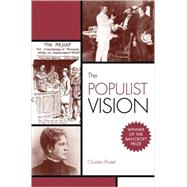
Note: Supplemental materials are not guaranteed with Rental or Used book purchases.
Purchase Benefits
What is included with this book?
| Introduction: Modern Times | |
| Farmers | |
| Push and Energy: Boosterism and Rural Reform | |
| Knowledge and Power: Machinery of Modern Education | |
| A Better Woman: Independence of Thought and Action | |
| A Farmers' Trust: Cooperative Economies of Scale | |
| Populists | |
| Business Politics: State Models and Political Frameworks | |
| Race Progress: Racial Ordering of American Life | |
| Confederation: Labor, Urban, and Nonconformist Reform | |
| Shrine of Science: Innovation in Populist Faith | |
| Conclusion: Populist Defeat and its Meaning | |
| Sources | |
| Table of Contents provided by Publisher. All Rights Reserved. |
The New copy of this book will include any supplemental materials advertised. Please check the title of the book to determine if it should include any access cards, study guides, lab manuals, CDs, etc.
The Used, Rental and eBook copies of this book are not guaranteed to include any supplemental materials. Typically, only the book itself is included. This is true even if the title states it includes any access cards, study guides, lab manuals, CDs, etc.